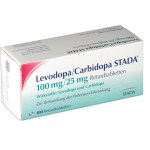- Type of Drug: Antiparkinsonian.
- Prescribed for: Parkinson’s disease; restless legs syndrome; pain associated with herpes zoster (shingles).
Levodopa (L-dopa) General Information
Parkinson’s disease can develop as a result of changes in the utilization of dopamine in the brain or damage to the central nervous system caused by carbon monoxide poisoning or manganese poisoning. It usually develops in older adults because of hardening of the arteries. In many other cases, the cause is not known. Levodopa works by entering the brain, where it is converted to dopamine, a chemical found in the central nervous system. The new dopamine replaces what is deficient in people with Parkinson’s disease. Some people who take Levodopa develop the “on-off” phenomenon, in which they may suddenly lose all drug effect and then regain it within minutes or hours. About 15 to 40 percent of people with Parkinson’s disease will develop this phenomenon after 2 to 3 years of Levodopa treatment. The on-off effect becomes more frequent after 5 years, and some people may experience a gradual decline of drug effect.
Levodopa (L-dopa) Cautions and Warnings
People with a history of heart attacks, severe heart or lung disease, glaucoma, asthma, or kidney, liver, or hormone diseases should be cautious about using this drug. Do not take it if you have a history of stomach ulcer. People with a psychotic history must be treated with extreme care; this drug can cause depression with suicidal tendencies. Levodopa may activate an existing malignant melanoma: People with a family history of melanoma or suspicious skin lesions should not take this drug.
Levodopa (L-dopa) Possible Side Effects
- Most common: muscle spasms or inability to control arms, legs, or facial muscles; loss of appetite; nausea; vomiting (with or without stomach pain); dry mouth; drooling; difficulty eating (due to poor muscle control); tiredness; hand tremors; headache; dizziness; numbness; weakness or a faint feeling; confusion; sleeplessness; grinding of the teeth; nightmares; euphoria (feeling “high”); hallucinations; delusions; agitation; anxiousness; and general feelings of ill health.
- Less common: heart irregularities or palpitations, dizziness when standing or rising (particularly in the morning), mental changes (depression, with or Without suicidal tendencies; paranoia; loss of some intellectual function), difficulty urinating, muscle twitching, burning of the tongue, bitter taste, diarrhea, constipation, unusual breathing patterns, blurred or double vision, hot flashes, weight gain or loss, darkening of the urine, and increased perspiration.
- Rare: stomach bleeding, development of an ulcer, high blood pressure, convulsions, adverse effects on the blood, difficulty controlling the eye muscles, feeling of being stimulated, hiccups, loss of hair, hoarseness, decreasing size of male genitalia, and retention of fluids.
Levodopa (L-dopa) Drug Interactions
- The effect of Levodopa is decreased when it is used together with an anticholinergic drug (such as Trihexyphenidyl). Other drugs that may interfere with Levodopa are benzodiazepine-type tranquilizers and sedatives, phenothiazine antipsychotic medicines, Phenytoin, Methionine, Papaverine, Pyridoxine, and tricyclic antidepressants.
- Antacids can increase the effects of Levodopa.
- Metoclopramide may increase the amount of Levodopa absorbed into the bloodstream and Levodopa may reduce Metoclopramide’s effects on your stomach.
- Levodopa can interact with drugs for high blood pressure to cause further reduction of pressure. Dosage adjustments in the high blood pressure medication may be needed. Methyldopa (a drug for high blood pressure) may increase the effects of Levodopa.
- People taking monoamine oxidase (MAO) inhibitor drugs should stop taking them at least 2 weeks before starting to take Levodopa.
Food Interactions
Do not take vitamin preparations that contain vitamin B6 (Pyridoxine), because this vitamin will decrease the effectiveness of Levodopa.
Since this drug can cause stomach upset, take each dose with food. A low-protein diet may help to minimize fluctuations in response to this drug that occur in some people.
Usual Dose
0.5 to 8 grams per day. Dosage must be individualized to your specific needs.
Overdosage
People taking an overdose of Levodopa must be treated in a hospital emergency room immediately. ALWAYS bring the medicine bottle with you.
Levodopa (L-dopa) Special Information
Be careful while driving or operating any complex or hazardous equipment.
Call your doctor immediately if any of the following occur: fainting, dizziness or light-headedness; abnormal diabetic urine tests for sugar or ketones; uncontrollable movements of the face, eyelids, mouth, tongue, neck, arms, hands, or legs; mood changes; palpitations or irregular heartbeats; difficulty urinating; severe nausea or vomiting.
If you forget to take a dose of Levodopa, take it as soon as possible. However, if it is within 2 hours of your next dose, skip the missed dose and go back to your regular schedule. Do not take a double dose.
Levodopa (L-dopa) Special Populations
Pregnancy/Breast-feeding
Levodopa has not been studied in humans; however, animal studies indicate that Levodopa may interfere with fetal development. Pregnant women should take this drug only if it is absolutely necessary.
Nursing mothers taking this drug should bottle-feed their infants.
Seniors
Older adults may require smaller doses because they are less tolerant to the drug’s Side effects. Also, the body enzyme that breaks the drug down decreases with age, so a large dose is not heeded.
Seniors who respond to Levodopa treatments, especially those with osteoporosis, should resume activity gradually. Sudden increases in mobility may increase the risk for broken bones.
Seniors, especially those with heart disease, are more likely to develop abnormal heart rhythms and other cardiac side effects. Regular monitoring by your doctor is essential.

